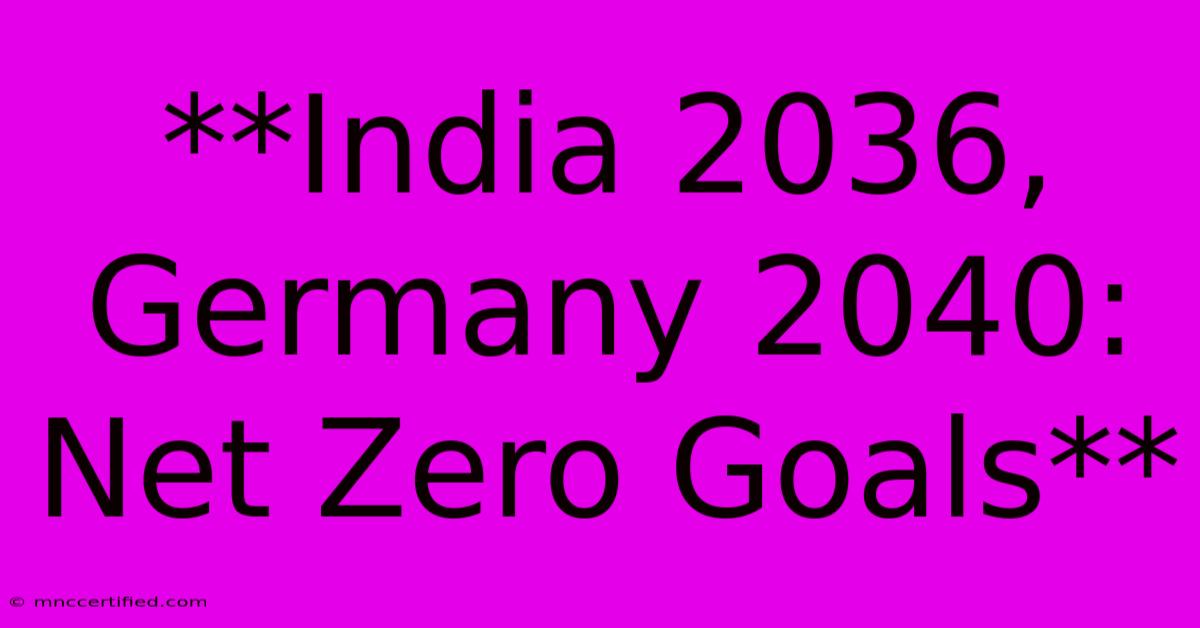**India 2036, Germany 2040: Net Zero Goals**

Table of Contents
India 2036, Germany 2040: A Race to Net Zero and a Sustainable Future
The global climate crisis is a pressing concern, demanding immediate action from nations worldwide. Two major economies, India and Germany, have set ambitious targets for achieving net zero emissions – India aiming for 2036 and Germany for 2040. These ambitious goals highlight their commitment to a sustainable future, but the path to achieving them presents both challenges and opportunities.
India's Net Zero Ambition: Balancing Growth with Sustainability
India, a nation known for its rapid economic growth, has pledged to achieve net zero emissions by 2036. This ambitious goal is part of the country's commitment to the Paris Agreement, aiming to limit global warming to well below 2 degrees Celsius above pre-industrial levels.
Key initiatives driving India's net zero journey:
- Renewable energy expansion: India has set ambitious targets for renewable energy deployment, including solar, wind, and hydropower.
- Energy efficiency: Initiatives are underway to improve energy efficiency across various sectors, from buildings to transportation.
- Sustainable agriculture: Promoting sustainable practices in agriculture, including precision farming and organic farming, is crucial for reducing emissions.
- Green hydrogen: India is investing heavily in green hydrogen production, aiming to replace fossil fuels in various industrial sectors.
Challenges facing India's net zero goals:
- Heavy reliance on fossil fuels: India continues to rely heavily on fossil fuels for its energy needs, presenting a significant challenge for emissions reduction.
- Limited access to clean energy technologies: India faces limitations in accessing and deploying clean technologies, particularly in rural areas.
- Financing constraints: Securing the necessary financial resources for large-scale investments in renewable energy and clean technologies is crucial.
Germany's Net Zero Trajectory: A Leader in Green Technologies
Germany, a pioneer in renewable energy and climate action, has set a 2040 target for achieving net zero emissions. The country has long been a leader in promoting green technologies and adopting renewable energy sources.
Key factors contributing to Germany's net zero progress:
- Strong renewable energy infrastructure: Germany boasts a robust renewable energy infrastructure, primarily powered by solar and wind energy.
- Technological innovation: Germany is at the forefront of developing and deploying green technologies, including electric vehicles, hydrogen technologies, and carbon capture and storage.
- Policy support: The German government has introduced comprehensive policies to incentivize renewable energy development and reduce emissions, such as feed-in tariffs and carbon pricing mechanisms.
Challenges ahead for Germany:
- Phased-out nuclear power: Germany's decision to phase out nuclear power has created a gap in its energy mix that needs to be addressed with renewable energy.
- Industrial transition: Transitioning heavy industries, like steel and manufacturing, to a low-carbon model requires significant investments and technological innovation.
- Public acceptance: Ensuring public acceptance of renewable energy projects and the transition to a low-carbon economy is crucial for successful implementation.
The Importance of International Cooperation
While India and Germany are making significant strides towards net zero, the global nature of climate change demands international cooperation and collaboration.
Benefits of joint action:
- Sharing knowledge and expertise: Sharing best practices and technologies between countries can accelerate the transition to a sustainable future.
- Financing opportunities: International collaboration can unlock access to funding for developing countries to invest in clean energy and climate adaptation measures.
- Global ambition: By working together, nations can create a strong global signal that climate action is a priority for all.
The road to net zero is not without its complexities, but the commitment and ambition of India and Germany set a powerful example for the world. Their journey towards a sustainable future will involve innovation, collaboration, and a shared responsibility to protect our planet.
Keywords:
- Net zero emissions
- India
- Germany
- Climate change
- Renewable energy
- Sustainability
- Green technologies
- Paris Agreement
- Sustainable development
- International cooperation
- Climate action

Thank you for visiting our website wich cover about **India 2036, Germany 2040: Net Zero Goals**. We hope the information provided has been useful to you. Feel free to contact us if you have any questions or need further assistance. See you next time and dont miss to bookmark.
Featured Posts
-
Tony Todd 1954 2024 A Life In Film
Nov 09, 2024
-
Scherzinger Defends Russell Brand Hat Comment
Nov 09, 2024
-
How Much Does Akko Cell Insurance Cost
Nov 09, 2024
-
Insurance Companies In Corsicana Texas
Nov 09, 2024
-
The Dog Stars Mescal And Scott Re Team On New Film
Nov 09, 2024